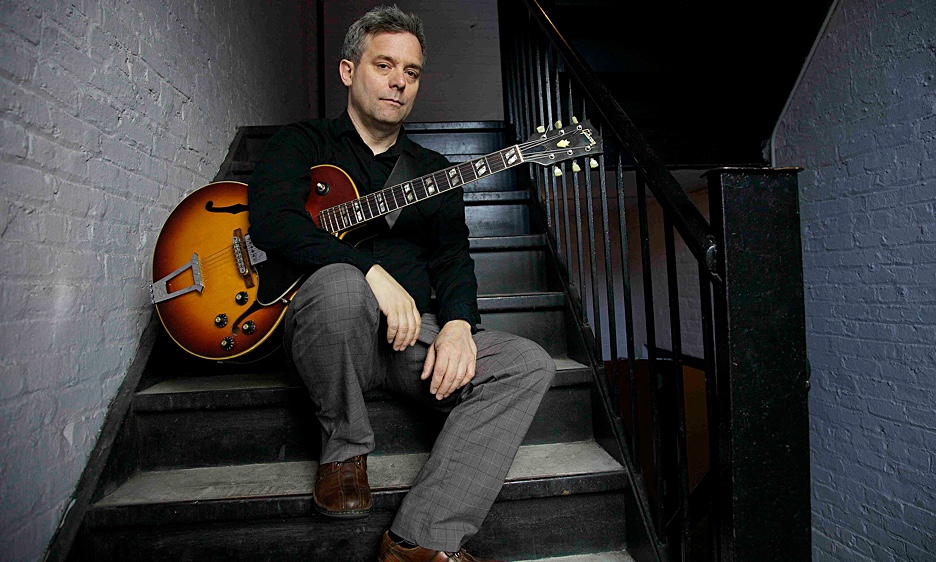Home » Jazz Articles » Catching Up With » Will Bernard Finds His Own Path To Jazz Career
Will Bernard Finds His Own Path To Jazz Career

There are a lot of different variations of being involved in a group, either as a complete side person or a more collaborative situation, or being the leader - and there are good things about all of those positions you can be in.
—Will Bernard
He says this occurred to him when he was being asked to play on some recording sessions in New York.
"In New York, I've been doing some recording—I did three records for PosiTone, which is more of a jazz label. They're actually based in L.A., but they record mostly in New York. He was calling me in to do jazz sessions, and I think, 'I'm not the regular jazz player.' I come from a lot of different places—it's like a challenge for me, to play with these guys who that's what they do: They go to the jazz schools, they're trained in that way. I didn't go to Berklee College of Music or New School. My early jazz training was people like Dave Creamer, most of it is on the job and learning, doing my own studying.
"I feel like in a way I've developed my own style, just from the way I've gone about it. A little bit of this and a little bit of that."
Growing up, Bernard's first musical memories are of folk music.
"I was an only child. I grew up in the fertile era of the '60s in Berkeley [California]. My parents used to have dinner parties, and it was the folk era, so they'd bring out guitars and sing folk music. Those would be my earliest memories."
But classical—and then rock—would soon make their way into his musical landscape as well.
"They got divorced early, and piano was her way of getting away from it all. She studied classical piano—and I really liked the Bartok when I was 5 years old and she was playing it. Peasant songs, folk songs. I think there are certain harmonies, and I liked bluesy-sounding things from an early age, a certain dissonance.
"Peter Apfelbaum grew up a block away, and had a drum set and he did a concert in kindergarten on the playground on a Ludwig! That turned my head around! I wanted a drum set, but I didn't get one. I was attracted, as most kids are, to rhythm and hitting things.
"I started taking piano when I was about 8, a private teacher. Then I started taking guitar at age 10, and that stuck. I was liking rock, I just wanted to play rock guitar. Then it took me awhile to get into jazz."
Bernard said the first record he ever bought on his own was classical: "Schubert, by the Trio Stern/Rose/Istomi. The second was Meet the Beatles."
His earliest repertoire was neither classical nor rock, however.
"I learned a lot of folk songs, I remember 'The Rock Island Line,' 'Nobody Knows You When You're Down and Out'—songs like that I liked, folk songs that had some blues and jazz elements to them.
"In the mid-'70s, there was a big fusion thing that got me into jazz—Mahavishnu, Weather Report, Chick Corea, Frank Zappa—and I got to see all those people play. I got heavier into straight jazz, avant-garde jazz, and avant-garde classical. Then I went to school and mostly studied classical composition: San Francisco State, then transferred to U.C. Berkeley. Before that, my jazz teacher, Dave Creamer, taught me a lot. His claim to fame was playing on Miles' 'On the Corner.' He was more of a bebop, line-oriented kind of guy, but he was very advanced. He was very kind of a shut in, liked to stay home and practice."
While Bernard says he wasn't yet informed enough at the time to fully appreciate Creamer's reputation, he was aware that his guitar teacher was pretty special.
"I knew Dave was a great, incredible musician, and a great teacher. And later, I heard George Benson came to visit him and asked him, 'Who do you want to play with?' and Dave said, 'Miles Davis,' and so he got a call from Miles a week or two later. I didn't really know that part of the story, but I knew he was a heavy cat. And I still have a lot of his handouts, and he's still around—a year or two ago, he sent me a book he'd just written on octatonic scales, 800 pages on octatonic scales. When I was a teen, he was into sweet picking and hexatonic scales. All kinds of stuff I got exposed to him from him.
"He wasn't doing it like Frank Gambale, he was doing it like a lot of players are doing it now—incorporating it into linear playing."
Bernard said that even though he was still a teenager and just finding his way on guitar, he was able to comprehend much of what Creamer was showing him.
"I was getting it! I wasn't able to incorporate it into my playing at all at once, but I understood the meaning of it."
It was when he was about 14 that he first began earning money with his guitar.
"I was in a band, we'd play different little places. An electric band, called Scream. We'd play at this club called Ashkenaz in Berkeley; it's still there. It started out as an Israeli folk dance club. Somehow I managed to get us gigs, and all the kids would come down.
"It was a place where a lot of world music came though—a lot of reggae, a lot of African bands."
Bernard's band, Scream, however, stuck to the rock basics of the time: "Allman Brothers, Zeppelin, Stones, stuff like that."
After finishing his university studies, Bernard said he was trying to figure out what came next.
"I didn't want more school, and I just started playing in wedding bands and stuff like that. Which paid more than the record store gig that I had at the same time.
"In the mid-'80s I started playing in Peter Apfelbaum's Hieroglyphics Ensemble, which he started in the '70s.
"[Trumpeter] Steven Bernstein was also in the high school jazz band I was in. Steven moved right away to New York; and some other people moved to New York.
"Peter stayed in Berkeley. He had this 16-piece group. Then he got signed. First we did a record with Don Cherry, and I think people started taking notice. We did a couple records for Antilles.
"Hans Wendl and Lee Townsend were these two producers / managers who moved here from New York and had been working with Bill Frisell, so they started managing Hieroglyphics Ensemble. I got to be friendly with them, and I kept bringing tapes to Lee, and he'd be looking for local groups, and I brought him this tape of T.J. Kirk. He shopped it around and got us a deal with Warner Brothers."
T.J. Kirk was a three-headed monster of Bernard, John Schott and Charlie Hunter on guitar, with drummer Scott Amendola.
"Everybody was hot on Charlie Hunter right then—it was like the acid jazz thing. He was a Berkeley guy, too. He had the seven-string guitar—two pickups, the lower strings on a bass amp, and the higher strings on a guitar amp.
"It was kind of a main project for me and John Schott, but it was kind of a side project for Charlie, even though it was on Warner Brothers. He got signed to Blue Note at the same time. But it opened up doors—I got my first deal through that, on Antilles, which was part of the Verve Group.
"That was kind of the time that Robert Walter and Stanton Moore were running around with Galactic and the Greyboy Allstars. We did at least one double bill with the Greyboy Allstars and T.J. Kirk.
"I was coming from a little bit different place than those guys. I'd already gone through classical music school, and had this weird band with T.J. Kirk doing Thelonious Monk and Roland Kirk. These guys were more into old funk 45s and New Orleans music from the '60s and '70s.
"I had various groups I was leading, and I can't remember when I first started playing with Robert, but I remember Charlie and Stanton had the same manager, and he put together this benefit with Les Claypool and Robert. Around that time, Zander Andreas, who ran this club, the Boom Boom Room in San Francisco, started working with him down in New Orleans. I started playing with Robert's 20th Congress. I was down in New Orleans, sitting in, and he asked, 'You want to be in a band?'
"We'd go down to New Orleans a lot. One year, I sat in with Galactic at the Mountain Air Festival. Stanton knew about T.J. Kirk. Basically the Stanton Moore Trio came out of that. Stanton wanted to hone it down to a trio. He said, 'I want to do three records with this group'—he had it all planned out in his head. And that's exactly what we did!"
About 15 years ago, Bernard belatedly followed some of his earliest musical cohorts in making the move to New York City— but also keeps a place in Berkeley (where he was during this Zoom interview).
"I'm more or less bi-coastal. It took me a long time to move out there—a lot of my friends had moved out earlier. Todd Sickafoose asked me if I'd turn off the lights here when I moved, because everybody's moving."
Bernard has been on a tear as leader of late, releasing Freelance Subversives in 2020, Ancient Grains last year, and most recently, Pond Life in May, with drummer Ches Smith and Chris Lightcap on bass, along with guest artists Tim Berne on saxophone and John Medeski on keyboards.
"This album we had recorded before the pandemic. It was a direction I wanted to explore more, as I'd done a record with Ches Smith in 2004, called Directions To My House. We were both living in Berkeley at that time, and we'd developed a rapport. He has an interesting way of interpreting my music, he brings certain things out in my playing. So I've always wanted to do another one with him. I just went in and did the songs that were written especially for this group."
This new record also represented another new direction for Bernard: Self-releasing it.
"I paid for this out of my pocket. I was on many labels, and basically not getting any money back after the original advance, and mechanicals and publishing. They paid for it, and did the publicity and everything, so now a lot of us are doing it on our own."
But Bernard said self-releasing has its own challenges, in that without a label to support you, you're left doing your own publicity, order fulfillment, etc.
"Most of us just want to play music and not have to have ten jobs."
Bernard said he already has ideas for another three or four albums, but also enjoys staying involved in playing with and for other musicians on their projects as well.
"There are a lot of different variations of being involved in a group, either as a complete side person or a more collaborative situation, or being the leader—and there are good things about all of those positions you can be in. I like to to be able to experience them all if possible. Sometimes it's nice to just be a sideman, and just go in and play and do your best to bring out whatever music you're playing. That's the only responsibility—you don't have to do anything else.
"This group we have, Mad Skillet, with John Medeski, that's a collaborative group. It's very refreshing, because everybody has input.
"Being a leader is a lot harder. You have to do everything. But there's a reward from being able to have a vision, and flesh it out.. You have to find the right people to play the music, find an audience."
Bernard said there is an art to putting together a band.
"I feel like I've gotten a lot better at this after being experienced. It's finding people who are like-minded, which is not always so easy. Living in New York, there's such a larger number of musicians to draw on , so I can find them easier there than I could here.
"For instance, I just did a tour with my band Freelance Subversives, the West Coast run, and I brought two guys from New York, and then got guys out here I'd played with a long time, who I knew could learn the music quickly. I feel like I've been playing a long time, and I know a lot of musicians I've been playing with for a long time whom I can pick and I know how they sound."
Tags
Catching Up With
Will Bernard
Jim Trageser
Dave Creamer
Peter Apfelbaum
Weather Report
Chick Corea
Frank Zappa
george benson
Miles Davis
Frank Gambale
Don Cherry
Bill Frisell
T.J. Kirk
John Schott
Charlie Hunter
Scott Amendola
Robert Walter
Stanton Moore
Galactic
Greyboy Allstars
Thelonious Monk
Roland Kirk
Les Claypool
Todd Sickafoose
Ches Smith
Chris Lightcap
Tim Berne
John Medeski
PREVIOUS / NEXT
Support All About Jazz
 All About Jazz has been a pillar of jazz since 1995, championing it as an art form and, more importantly, supporting the musicians who make it. Our enduring commitment has made "AAJ" one of the most culturally important websites of its kind, read by hundreds of thousands of fans, musicians and industry figures every month.
All About Jazz has been a pillar of jazz since 1995, championing it as an art form and, more importantly, supporting the musicians who make it. Our enduring commitment has made "AAJ" one of the most culturally important websites of its kind, read by hundreds of thousands of fans, musicians and industry figures every month.






















